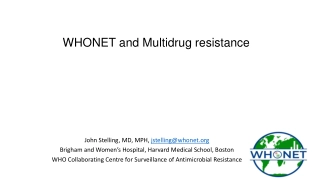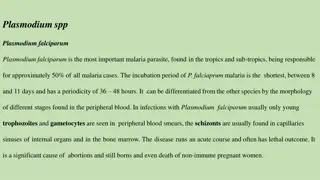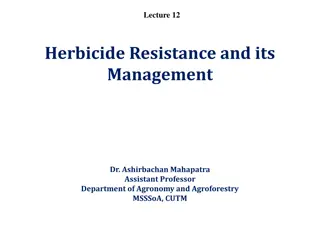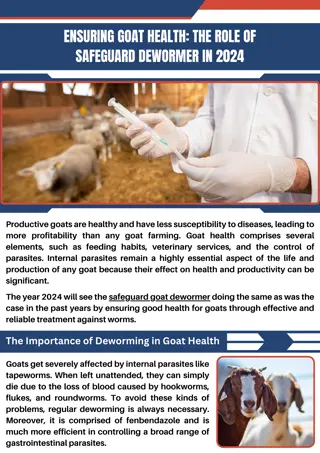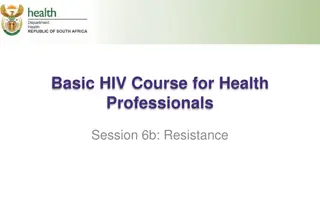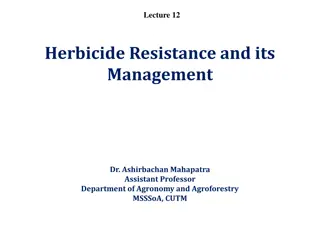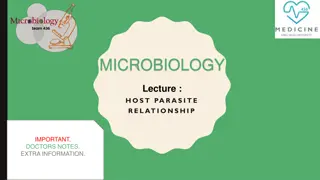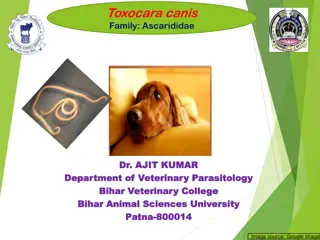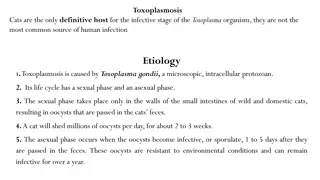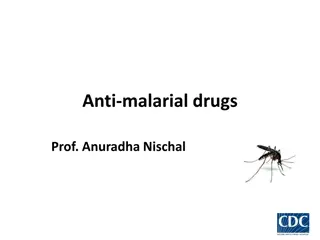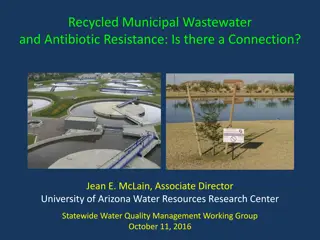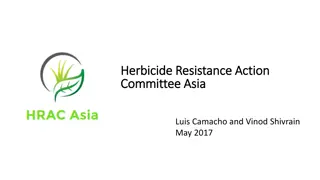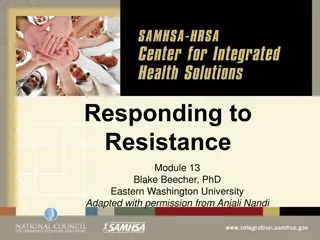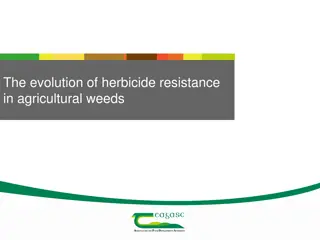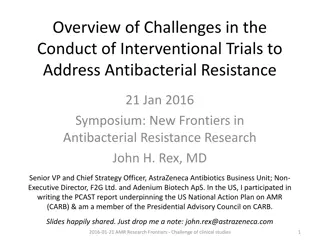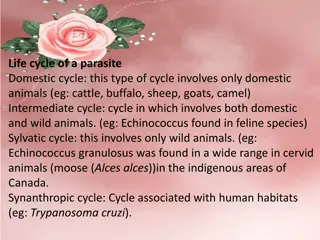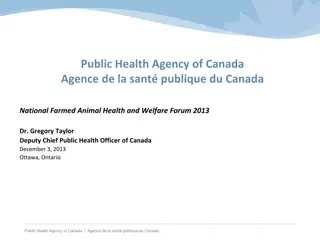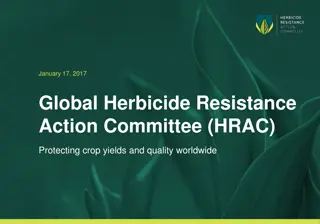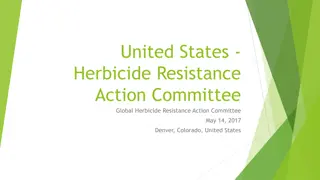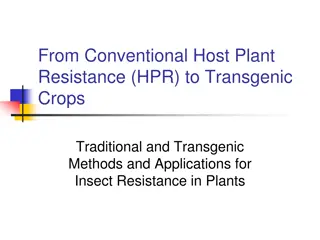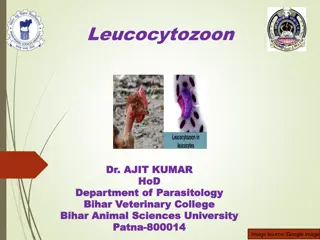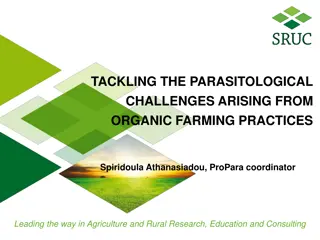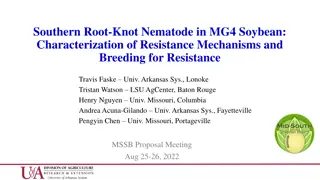Understanding Multidrug Resistance in Bacterial Infections
Multidrug resistance refers to organisms resistant to multiple antibiotics, impacting therapy decisions, increasing morbidity and mortality, and raising healthcare costs. Monitoring resistance profiles can aid in tracking outbreaks, with molecular typing confirming issues. Join the WHONET Webinar Se
0 views • 35 slides
Overview of Plasmodium falciparum and Plasmodium vivax Malaria Parasites
Plasmodium falciparum is the most significant malaria parasite, responsible for about 50% of cases, with a short incubation period and distinct morphology in blood smears. It causes severe symptoms and complications, affecting various organs. In contrast, Plasmodium vivax is the most common malaria
2 views • 7 slides
Understanding Herbicide Resistance and Management
Herbicide resistance is the inheritable ability of certain weed populations to survive herbicide treatments that would typically control them. This resistance is a natural process, influenced by factors like genetic diversity, herbicide selection pressure, and resistance mechanisms. Effective manage
12 views • 14 slides
Control Internal Parasites In Animals
Parasite infections of goats can lead to improper digestion, reduced feed intake, weight loss, anemia and even death. Shop our safeguard goat dewormer to keep your goats healthy and parasite-free. Send us an email at sales@hubersanimalhealth.com for
0 views • 2 slides
Trends in Gonococcal Resistance to Therapies in England and Wales Since 2011 Guideline Change
Antimicrobial resistance in Neisseria gonorrhoeae poses challenges for treatment. This study examines trends in ceftriaxone, azithromycin, and cefixime resistance since the 2011 guideline change in the UK. Data from the Gonococcal Resistance to Antimicrobial Surveillance Programme is analyzed to tra
0 views • 12 slides
Understanding Forces: Gravity, Air Resistance, and Parachutes
Explore the concepts of gravity, air resistance, weight versus mass, and how they relate to objects in motion. Discover how Sir Isaac Newton's discoveries shaped our understanding of forces, and learn how air resistance affects the speed of falling objects. Delve into the mechanics of parachutes and
0 views • 9 slides
Understanding Ohm's Law and Electrical Resistance
Explore the principles of Ohm's Law and electrical resistance, understanding how resistance affects electron flow in circuits, the relationship between voltage drop and resistance, and practical examples of applying Ohm's Law in circuit calculations. Discover the impact of resistance in wires and ho
0 views • 19 slides
Understanding Wheatstone Bridge Circuit for Resistance Measurement
Wheatstone Bridge is a precise instrument for measuring unknown electrical resistances by balancing a bridge circuit. This practical application involves using resistors of known values to determine the unknown resistance. The voltage division formula plays a key role in calculating the unknown resi
0 views • 9 slides
Understanding Water Resistance in Everyday Life
Water resistance is a type of friction experienced when objects move through water, similar to air resistance. This force slows down objects moving through water, like when swimming. Animals and humans adapt by using streamlined designs to reduce water resistance. Experimenting with different shaped
1 views • 11 slides
Understanding HIV Drug Resistance in Health Professionals
Combination antiretroviral therapy (ART) is effective against HIV but can lead to drug resistance if not taken consistently. HIV mutates rapidly, increasing the risk of drug-resistant strains emerging. Learn about the causes, types of resistance, testing methods, and prevention strategies to combat
0 views • 23 slides
Strategies to Overcome Resistance to Change in Organizations
Overcoming resistance to change is crucial in change management projects. This process involves planning for, identifying, and managing various forms of resistance. Understanding why people resist change and utilizing strategies such as seeking feedback, effective communication, and proactive manage
0 views • 11 slides
Understanding Herbicide Resistance in Weeds: Insights and Management Strategies
Herbicide resistance is a naturally occurring phenomenon in weed populations, impacting the effectiveness of herbicide treatments. This resistance can be passed down through generations and is influenced by various factors such as cultural practices, herbicide mechanisms, and the biology of weed spe
0 views • 14 slides
Understanding Host-Parasite Relationship in Microbiology
In microbiology, the host-parasite relationship is crucial for understanding diseases caused by pathogens. This lecture covers definitions of terms like pathogenicity, pathogen, disease, resistance, susceptibility, infection, virulence, and transmissibility. It also delves into the division of host
0 views • 16 slides
Comprehensive Overview of Toxocara canis Life Cycle and Characteristics
Toxocara canis, also known as the Arrow-headed worm, is a parasite commonly found in dogs, particularly in puppies less than six months old. This article explores the general characteristics, life cycle, transmission routes, and prenatal infections of Toxocara canis. From the appearance of the male
0 views • 12 slides
Understanding Toxoplasmosis: Causes, Transmission, and Hosts
Toxoplasmosis is caused by the Toxoplasma gondii parasite, with cats being the definitive host. The parasite's life cycle involves both sexual and asexual phases, leading to potential infection in humans and other animals. Transmission can occur through contact with cat feces, ingestion of contamina
0 views • 10 slides
Data Analysis and Experimental Results on Cell Activation, Animal Behavior, and Parasite Infection
The analysis covers research findings on cell activation in T cells, mice weight differences, arachnophobia reactions, cane toad parasite infection rates in different areas of Queensland, and neutrophil responses between KO and WT groups. It includes sample size calculations for statistical power in
0 views • 7 slides
Understanding Malaria: Causes, Symptoms, and Treatment
Malaria, caused by the Plasmodium parasite and transmitted through the bite of infected mosquitoes, is a major global health concern leading to millions of illnesses and deaths annually. The life cycle of the parasite involves different stages in the human host and the mosquito vector. Effective ant
1 views • 107 slides
Entamoeba histolytica: Protozoan Parasite in Digestive Tract
Entamoeba histolytica is a zoonotic protozoan parasite found in the digestive tracts of various hosts. It exists in trophozoite and cyst forms, with trophozoites containing erythrocytes and pseudopodia. The cyst stage is characterized by spherical masses discharged by trophozoites and containing chr
0 views • 17 slides
Understanding Antibiotic Resistance in Recycled Wastewater
Explore the potential connection between recycled municipal wastewater and antibiotic resistance. Antibiotic-resistant bacteria pose a serious threat, fueled by factors like horizontal gene transfer and high antibiotic dosages in clinical settings. Environmental antibiotic resistance, linked to agri
4 views • 46 slides
Understanding Electric Circuits: Current, Voltage, and Resistance
Electric circuits involve the flow of electric current through conductors with varying levels of resistance. Current (I) is the amount of charge passing through a point in a wire per unit of time, measured in amperes. Voltage (V) is the potential difference required to make electrons flow in a condu
0 views • 25 slides
Understanding Parasitology: A Comprehensive Overview
Parasitology is the study of parasites, their hosts, and the interactions between them. This field explores the different aspects of parasitism, including the relationships between parasites and hosts, the classification of major parasite groups like protozoa, helminths, and arthropods, and terms cr
0 views • 16 slides
Challenges and Trends in Herbicide Resistance Management in Asia-Pacific Region
The Asia-Pacific region faces challenges with herbicide resistance, particularly in countries like China and Australia. Issues include incorrect herbicide application, resistance cases reported, and concerns about glyphosate resistance. Additionally, the introduction of herbicide-tolerant traits in
0 views • 11 slides
Dealing with Resistance in Counseling: Techniques and Strategies
Understanding resistance in counseling is crucial for effective communication and rapport building. This module explores various forms of resistance, counselor behaviors that elicit resistance, and ways to diminish resistance. Learning to respond differently to resistance can lead to valuable feedba
0 views • 27 slides
Understanding Herbicide Resistance in Agricultural Weeds
This comprehensive content covers the evolution of herbicide resistance in agricultural weeds, including the origins of herbicides, cases of resistance, target site resistance, and non-target site resistance. It explains the definition of weeds, types of herbicides, selective and non-selective herbi
0 views • 32 slides
Challenges in Conducting Interventional Trials for Antibacterial Resistance
Addressing antibacterial resistance through interventional trials presents challenges relating to nomenclature, trial design implications, and the continuous evolution of resistant bacteria categories. The discussion emphasizes the need for a sustained pipeline of novel therapies to combat resistanc
0 views • 39 slides
Effective Strategies for Addressing Resistance in Motivational Interviewing Sessions
Explore the key concepts of team functioning and motivational interviewing, learn to intervene with clients effectively, and understand resistance as a barrier to change. Discover strategies to address resistance, identify different types of resistance, and learn to navigate through various expressi
0 views • 27 slides
Evaluation of Terminal Sire Breeds for Hair Sheep Production Systems: Year 3 Study
This study evaluates the efficacy of terminal sire breeds in hair sheep production systems to produce high-value market lambs focusing on survivability, growth, and parasite resistance. The research involves purebred Katahdin, Suffolk, and Texel sires, with a particular emphasis on grazing performan
0 views • 27 slides
Understanding Electric Currents and Resistance II in Physics
Capacitors, resistance, energy usage, and the microscopic picture of conductivity are explored in this lecture on electric currents and resistance II in Physics 2415. Discover the relationship between voltage, charge, current, and resistance, along with insights into power usage, resistivity, and th
0 views • 22 slides
Understanding Power Consumption and Resistance in Marine Engineering
Learn about hull resistance, factors affecting resistances and power consumption, propulsion chain efficiency, and power consumption of auxiliary equipment and hotel load in marine engineering. Explore different types of resistance such as frictional, residual, eddy, wave, and air resistance, along
0 views • 15 slides
Understanding the Complexities of Parasite Life Cycles and Host Interactions
Parasites exhibit diverse life cycles and behaviors, with cycles ranging from domestic to sylvatic environments. Factors influencing parasite diseases include host specificity, immunity, and host-parasite interactions. Parasitism can alter host behavior, impacting ecological dynamics. Immunology pla
0 views • 9 slides
Complexities of Antimicrobial Resistance in Farm Animals and Public Health
The epidemiology of antimicrobial resistance is multifaceted, involving various sectors such as aquaculture, soil, wildlife, human-animal interfaces, and more. The case study on ceftiofur resistance in chickens highlights the impact of antibiotic use on resistance levels in both animals and humans.
0 views • 4 slides
Global Herbicide Resistance Action Committee (HRAC): Protecting Crop Yields Worldwide
The Global Herbicide Resistance Action Committee (HRAC) is a global leader in managing herbicide resistance to safeguard crop yields and quality. They focus on collecting, assessing, and providing vital information to combat herbicide resistance. Their mission is to support industry experts working
0 views • 12 slides
United States Herbicide Resistance Action Committee Summary
Herbicide resistance is a critical issue being tackled by the United States Herbicide Resistance Action Committee (US HRAC). Formed in 2015, US HRAC operates independently from Global HRAC, focusing on specific areas while aligning on key herbicide resistance matters. The committee engages in variou
0 views • 6 slides
Understanding the Relationship between Decisional Second-Preimage Resistance and Preimage Resistance in Cryptographic Hash Functions
This work delves into the subtle question of when Decisional Second-Preimage Resistance (SPR) implies Preimage Resistance (PRE) in hash functions. It presents a tool for enabling tight security proofs for hash-based signatures by exploring the success probability of adversaries against collision res
0 views • 25 slides
Evolution of Plant Resistance to Insects: From Traditional Methods to Transgenic Crops
The transition from Conventional Host Plant Resistance (HPR) to Transgenic Crops for insect resistance in plants has a rich history dating back to the 1790s. Traditional methods like breeding for Hessian fly resistance in wheat have paved the way for modern techniques. Factors influencing insect res
0 views • 36 slides
Leucocytozoon: Haemoparasite in Birds from Bihar Animal Sciences University
Leucocytozoon, a haemoparasite found in birds, is studied at Bihar Animal Sciences University under Dr. Ajit Kumar. The parasite's morphology, life cycle, and host interactions are detailed, providing valuable insights into its impact on avian health. The research sheds light on the genus Leucocytoz
0 views • 13 slides
Innovations in Parasite Control for Organic Farming
ProPara is dedicated to optimizing parasite control strategies for organic farms through targeted research and innovative tools. By generating data, evaluating implementation strategies, and collaborating with key stakeholders, ProPara aims to enhance animal health and welfare in organic farming pra
0 views • 19 slides
Characterization of Resistance Mechanisms in MG4 Soybean against Southern Root-Knot Nematode
This study focuses on understanding the resistance mechanisms in MG4 soybean against the Southern Root-Knot Nematode (Meloidogyne incognita) and breeding for resistant varieties. Researchers are characterizing resistance, developing new markers, and creating varieties with enhanced resistance. Field
0 views • 9 slides
Impact of Resistance on Parasite Fitness in Quinoline-based Antimalarial Drugs
Resistance cost of fitness studies the impact of drug resistance on pathogens like Plasmodium berghei. Lumefantrine and Piperaquine, used in ACT against malaria, are investigated to understand how resistance affects parasite fitness. The research aims to provide insights into combating drug resistan
0 views • 15 slides
Understanding Giardia: Morphology, Life Cycle, and Pathogenesis
Giardia is a protozoan parasite that causes chronic diarrhea in various hosts, including humans and animals. This parasite has unique morphology with trophozoite and cyst stages. Its life cycle involves direct reproduction through binary fission and transmission through contaminated food or water. G
0 views • 19 slides
